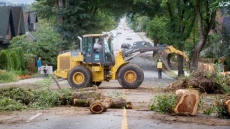VANCOUVER — Canada's proposed edible pot regulations would result in tasteless products wrapped in wasteful packaging, shutting out medical patients and fuelling a continued black market, critics say.
The consultation period on the proposed rules ended Wednesday and Health Canada is now reviewing the responses. Jessika Villano, owner of Buddha Barn dispensary in Vancouver, says she hopes the government genuinely wants her opinion.
"I don't feel like anybody's been listening. I feel a little bit deflated, actually," she said.
When Canada legalized weed last fall, it only allowed fresh or dried bud, oil, plants and seeds. Health Canada released its proposed regulations for edibles, extracts and topicals in December and asked for feedback.
The government plans to have regulations in place for those products no later than Oct. 17 this year.
Villano said she's concerned about a number of elements of the proposed regulations. A single serving would be limited to 10 milligrams of THC, the psychoactive ingredient in cannabis, and each serving must be individually wrapped.
The rule is more strict than regulations in Colorado or Washington, where multiple servings are allowed per package, for example in a chocolate bar demarcated into squares that each contain 10 milligrams.
"I feel that Health Canada is creating an environmental nightmare," Villano said.
Long-time users who take cannabis to combat pain, stress or nausea use much higher doses, with some cancer patients using up to 650 milligrams per dose, she said. The regulations would outlaw higher-dose products and any substitute would be unattainably expensive, she said.
The regulations also say the products must not be appealing to youth and the packages can't advertise dessert or confectionery flavours. Edibles must also not "encourage over-consumption" and be shelf-stable, so no refrigeration.
While there's nothing in the rules that explicitly outlaws sweet ingredients, Villano said she's worried the restrictions mean brownies, cookies and candies are off-limits.
"They're proposing that we sell sand," Villano said. "I think a lot of adults would like to have cannabis sugar in their tea."
Health Canada was not able to provide a response before publication.
Yannick Craigwell's company, Treatsandtreats, sells sweet goodies containing up to 220 milligrams of THC to medical patients. His packaging isn't colourful or bright — it's simply a black bag with a clear window to show what's inside and a muffin on the logo. But the proposed regulations would not allow a cut-out window nor the advertising of confectionery flavours.
Craigwell said he hopes Health Canada sets up an office where companies can send their package designs for approval or disapproval, because "there's no way to know" what's acceptable based on the proposed regulations.
He said he had no doubt the black market would persist if the proposed rules are finalized without changes.
"If there's a need, people are going to fill that need. If there's a financial reward for filling that need, that's the whole premise of the black market," Craigwell said.
Bruce Linton, CEO of Canopy Growth Corp., said the rules aren't perfect, but they're very good. His company is developing a calorie-free cannabis beverage and he doesn't see an issue with the 10 milligram limit per serving for drinks.
The one type of product where the limit might be too strict is a vape pen, which usually hold a higher dose so they can be used on multiple occasions, he said.
But for the most part, the government is moving forward in a very well-regulated, incremental way, he said, adding it's easier to increase the allowed dosage later rather than decrease it.
"In the context of how governments normally work, this is astounding," Linton said.
"The government of Canada has come up with how you can drink and eat and vape cannabis and are regulating it at a federal level and are selling it through provincially controlled stores. Are you sure we're not making all this stuff up?"


